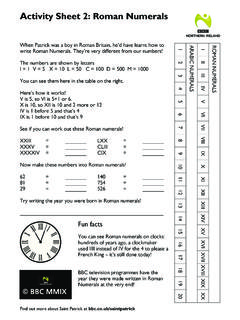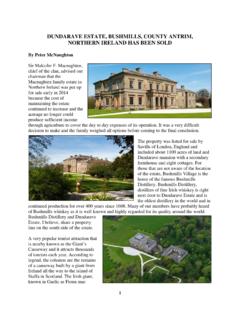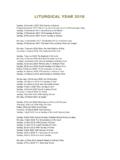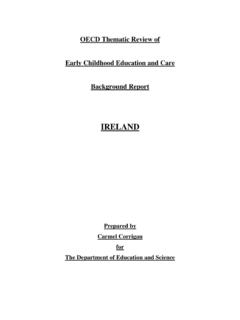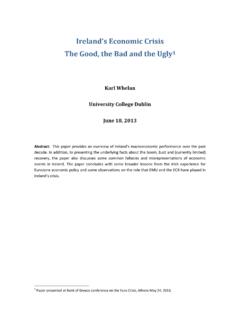Transcription of Who was Saint Patrick - milehibernians.com
1 Who was Saint Patrick ? Look at a calendar and you'll find holidays marked on certain days. For example, Americans celebrate Martin Luther King's birthday in January, President's Day in February and Independence Day on the Fourth of July. All of these holidays are related to important events in American history. But on the calendar for March you'll find that March 17 is St. Patrick 's Day. In the Catholic Church, St. Patrick is the patron Saint of Ireland. Since so many Irish people immigrated to the United States and celebrated St. Patrick 's Day after they arrived, St. Patrick 's Day has been assimilated (become a part of) American culture and lots of people do special things for this holiday.
2 St. Patrick lived in the fourth century It's hard to know exactly when he was born so long ago but it is known that he was born in Britain and that his parents were wealthy. When Patrick was sixteen his family estate was attacked by Irish robbers and they took Patrick back to Ireland as a prisoner where he stayed in captivity for six years. During this time Patrick worked as a shepherd and it is reported that he became a devout Christian. He claimed that God told him to leave Ireland and managed to escape his captors. Patrick made his way back to Britain. After returning to Britain, Patrick believed that an angel appeared to him in a dream to tell him to become a missionary in Ireland.
3 After fifteen years of study, he became a priest and then returned to Ireland to convert people to Christianity. Other stories about St. Patrick call him a bishop and say that he built schools, churches and monasteries. Without good written records, it's hard to know some of the exact details but legends abound. One legend says that St. Patrick drove the snakes out of Ireland. But scientists tell us that Ireland, which is an island, didn't have any snakes to begin with. The Druids were pagans in Ireland who used the serpent as a symbol and perhaps converting them to Christianity could be considered as driving out snakes. It's believed that St.
4 Patrick died on March 17. which is why we celebrate St. Patrick 's Day on that date. Name: _____ Date: _____. Multiple Choice Questions Circle the correct answer. 1. Why do we as American's celebrate St. Patrick 's Day if he is the patron Saint of Ireland? a. It's his birthday; we celebrate it like Martin Luther King Day b. He represents an important event in American history c. The Irish holiday has been assimilated into American culture d. None of the above 2. Where was St. Patrick born? a. Ireland b. America c. Britain d. France 3. What happened when robbers attacked his family's estate? a. They burned down the house. b. They took Patrick as a prisoner.
5 C. They took Patrick to the United States. d. They took Patrick to Britain. 4. Patrick eventually became a priest. Where did he serve as a missionary? a. Ireland b. Britain c. America d. All of the above 5. Who were the Druids? a. The robbers who attacked Patrick 's family estate b. Pagans living in Ireland c. Christians living in Ireland d. Bishops living in Britain 6. People say that St. Patrick 's drove the snakes out of Ireland. a. This is a legend. b. This may be symbolic of driving out paganism. c. Both a. and b. above d. None of the above Name: _____ Date: _____. Short Answer Questions 1. Why do we have holidays? 2. Why do Americans celebrate St.
6 Patrick 's Day? 3. How did Patrick spend his early life, up to about the age of 22? 4. What did Patrick do when he returned to Ireland? 5. Do you believe the legend that Patrick drove all the snakes out of Ireland? Why or why not? 6. Why do we celebrate St. Patrick 's Day in March? Name _____ Date _____. St. Patrick 's Day Vocabulary Words a person officially recognized, especially by canonization, as being entitled to public Saint veneration and capable of interceding for people on earth Irish of or relating to Ireland or its people, language, or culture blarney a stone in Blarney castle, Ireland, said to make those who kiss it proficient in the stone use of blarney emerald a brilliant green to grass-green transparent variety of beryl, used as a gemstone one of a race of elves in Irish folklore who can reveal hidden treasure to those who leprechaun catch them soft, yellow, corrosion-resistant element.
7 The most malleable and ductile metal, occurring in veins and alluvial deposits and recovered by mining or by panning or sluicing. A good thermal and electrical conductor, gold is generally alloyed to gold increase its strength, and it is used as an international monetary standard, in jewelry, for decoration, and as a plated coating on a wide variety of electrical and mechanical components the capital and largest city of Ireland, in the east-central part of the country on the Dublin Irish Sea an arc of spectral colors, usually identified as red, orange, yellow, green, blue, rainbow indigo, and violet, that appears in the sky opposite the sun as a result of the refractive dispersion of sunlight in drops of rain or mist a trifoliate plant used as a national emblem by the Irish.
8 The legend is that St. shamrock Patrick once plucked a leaf of it for use in illustrating the doctrine of the trinity. parade an organized public procession on a festive or ceremonial occasion colcannon an Irish dish of mashed potatoes and cabbage, seasoned with butter luck The chance happening of fortunate or adverse events St. Patrick a patron Saint of Ireland; an English missionary to Ireland in the 5th century Belfast the capital and largest city of Northern Ireland Teachnology, Inc. All Rights Reserved. Name _____ Date _____. St. Patrick 's Day Crossword Puzzle Worksheet Teachnology, Inc. All Rights Reserved. Name _____ Date _____.
9 Across Down 1. a brilliant green to grass-green 2. the capital and largest city of Ireland, transparent variety of beryl, used as a in the east-central part of the country on gemstone the Irish Sea 3. stone a stone in Blarney castle, 3. the capital and largest city of Ireland, said to make those who kiss it Northern Ireland proficient in the use of blarney 4. The chance happening of fortunate or 5. one of a race of elves in Irish folklore adverse events who can reveal hidden treasure to those who catch them 7. an organized public procession on a festive or ceremonial occasion 6. an arc of spectral colors, usually identified as red, orange, yellow, green, 9.
10 Of or relating to Ireland or its people, blue, indigo, and violet, that appears in language, or culture the sky opposite the sun as a result of the refractive dispersion of sunlight in 10. an Irish dish of mashed potatoes drops of rain or mist and cabbage, seasoned with butter 8. a person officially recognized, especially by canonization, as being entitled to public veneration and capable of interceding for people on earth 11. soft, yellow, corrosion-resistant element, the most malleable and ductile metal, occurring in veins and alluvial deposits and recovered by mining or by panning or sluicing 12. a trifoliate plant used as a national emblem by the Irish.
